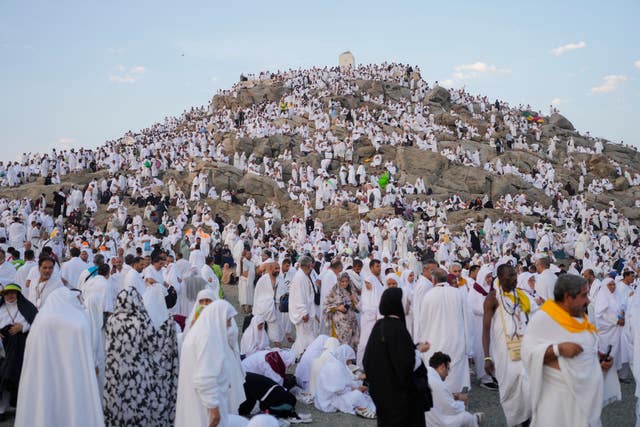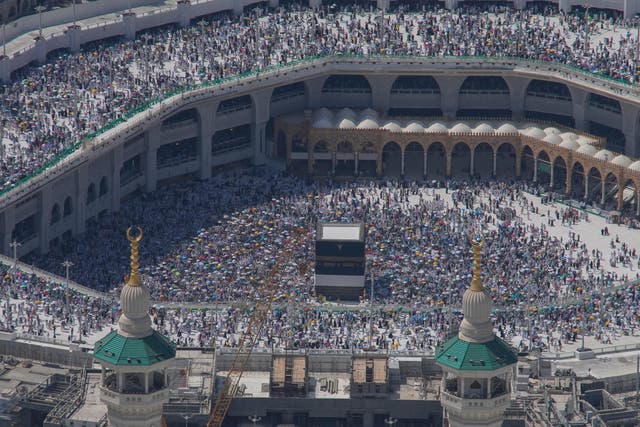
More than 1,300 people died during this year’s Hajj pilgrimage in Saudi Arabia as the faithful faced extreme high temperatures at Islamic holy sites in the desert kingdom, officials have said.
Saudi Health Minister Fahd bin Abdurrahman Al-Jalajel said that 83% of the 1,301 fatalities were unauthorised pilgrims who walked long distances in soaring temperatures to perform the Hajj rituals in and around the holy city of Mecca.
Speaking with the state-owned Al Ekhbariya TV, the minister said 95 pilgrims were being treated in hospitals, some of whom were airlifted for treatment in the capital, Riyadh. He said the identification process was delayed because there were no identification documents with many of the dead pilgrims.
He said the dead were buried in Mecca, without giving a breakdown.
The fatalities included more than 660 Egyptians. All but 31 of them were unauthorised pilgrims, according to two officials in Cairo. Egypt has revoked the licenses of 16 travel agencies that helped unauthorized pilgrims travel to Saudi Arabia, authorities said.
Saudi Arabia has not commented on the deaths during the pilgrimage, which is required of every able Muslim once in their life.

Saudi authorities cracked down on unauthorised pilgrims, expelling tens of thousands of people. But many, mostly Egyptians, managed to reach holy sites in and around Mecca, some on foot. Unlike authorised pilgrims, they had no hotels to escape from the scorching heat.
In its statement, the government said the 16 travel agencies failed to provide adequate services for pilgrims. It said these agencies illegally facilitated the travel of pilgrims to Saudi Arabia using visas that do not allow holders to travel to Mecca.
The government also said officials from the companies have been referred to the public prosecutor for investigations.
The fatalities also included 165 pilgrims from Indonesia, 98 from India and dozens more from Jordan, Tunisia, Morocco, Algeria and Malaysia, according to an Associated Press tally. Two US pilgrims were also reported dead.
The AP could not independently confirm the causes of death, but some countries like Jordan and Tunisia blamed the soaring heat.

Associated Press journalists saw pilgrims fainting from the scorching heat during the Hajj, especially on the second and third days.
Deaths are not uncommon at the Hajj, which has seen at times more than two million people travel to Saudi Arabia for a five-day pilgrimage. The pilgrimage’s history has also seen deadly stampedes and epidemics.
But this year’s tally was unusually high, suggesting exceptional circumstances.
During the Hajj period, daily high temperatures ranged between 46C and 49C in Mecca and sacred sites in and around the city, according to the Saudi National Centre for Meteorology.
A 2015 stampede in Mina during the Hajj killed more than 2,400 pilgrims, the deadliest incident ever to strike the pilgrimage, according to an AP count. Saudi Arabia has never acknowledged the full toll of the stampede.
A separate crane collapse at Mecca’s Grand Mosque earlier the same year killed 111.
The second-deadliest incident at the Hajj was a 1990 stampede that killed 1,426 people.
The Hajj, one of the five pillars of Islam, is one of the world’s largest religious gatherings. More than 1.83 million Muslims performed the Hajj in 2024, including more than 1.6 million from 22 countries, and around 222,000 Saudi citizens and residents, according to the Saudi Hajj authorities.
Saudi Arabia has spent billions of dollars on crowd control and safety measures for those attending the annual five-day pilgrimage, but the sheer number of participants makes ensuring their safety difficult.


Comments: Our rules
We want our comments to be a lively and valuable part of our community - a place where readers can debate and engage with the most important local issues. The ability to comment on our stories is a privilege, not a right, however, and that privilege may be withdrawn if it is abused or misused.
Please report any comments that break our rules.
Read the rules hereLast Updated:
Report this comment Cancel